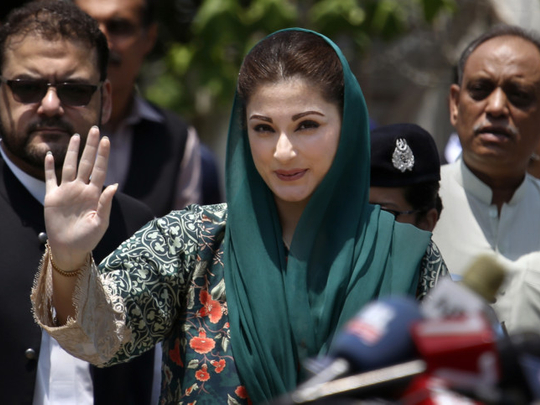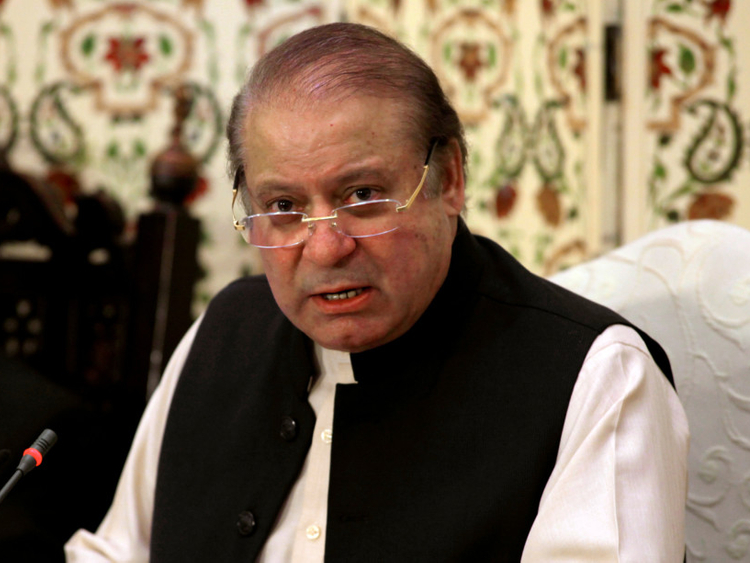
Thursday’s indictment of Pakistan’s former prime minister Nawaz Sharif along with his daughter, Maryam and her husband, Safdar, was hardly unexpected. Yet, as the noose tightens around Sharif’s political future, he is confronted more than ever before with profound questions over Pakistan’s future, as the country struggles to consolidate its fledgling democracy. In the aftermath of the indictment, Maryam lived up to her reputation as a defiant soul, choosing to once again question the manner in which her father was dismissed on July 28 this year by a verdict from Pakistan’s Supreme Court.
That historical outcome came more than a year after the Sharif family went on trial over the issue of massive unexplained wealth amassed outside Pakistan — noteably luxury apartments overlooking Hyde Park in central London.
In the aftermath of Sharif’s dismissal, his coterie of followers from the Pakistan Muslim League-Nawaz (PML-N) has actively sought to turn the tables by repeatedly referring to a conspiracy that apparently forced out their leader. However, the rare case of a political big-wig being punished in this manner only serves to consolidate Pakistan’s progression towards achieving a robust democracy. In brief, the gap between Sharif’s view of Pakistan’s politics and events on the ground only continues to widen as never before, and with a visible fallout.
Just hours after the indictment came the latest sign of a likely fracture within the PML-N, when Riaz Hussain Pirzada, a Cabinet minister in Islamabad, publicly called for Sharif’s replacement as the party’s leader. Though he suggested the choice of Shehbaz Sharif, the former prime minister’s younger brother, as the new party leader, Pirzada’s remarks offer an insight to the growing rift within the party.
Fundamentally, the former prime minister and the likes of his daughter have rejected the July verdict of the Supreme Court and in so doing have sought to challenge Pakistan’s apex court. Moreover, their followers, in private conversations, frequently refer to Pakistan’s Army seeking to destabilise Sharif and his party. Though there’s no evidence of such a sinister plan being hatched as Sharif’s trial progresses, the allegations from Sharif’s followers have relied mainly on Pakistan’s history of living under the military’s shadow. However, they are left effectively speechless when confronted with the obvious question: Given that the events that forced out Sharif were prompted by the widely publicised ‘Panama leaks’, which had names of several other individuals from across the globe, where is the conspiracy within Pakistan?
As this high political drama unfolds in Islamabad, Sharif faces a more pertinent challenge. Across Pakistan, noteably in his own Punjab province, there are few signs of a pro-Sharif groundswell of popular support. Clearly, the public has spoken or more appropriately ‘the chickens have come home to roost’! Sharif’s four-year rule saw his government clearly disregard some of Pakistan’s toughest challenges in daily life. In a country where poverty has remained widespread for years and some of the poorest of the poor struggle to access basic services like health care and education, Sharif oversaw fancy projects mostly related to the transport sector. In pressing ahead with his obsession with highways and fancy air-conditioned buses, Sharif seemed to have lost track of the basic necessities of the common people. And in the process, his government has saddled Pakistan with one of the largest corpuses of debts ever accumulated by any government in the country. Unfortunately, pressing need for reforms in tax collection have remained neglected. Consequently, the absence of any real clamour for Sharif’s return to power is indicative of the lack of popular support for the former prime minister rather than Pakistanis getting tired of democratic rule.
Beyond last Thursday’s indictment, many more politicians — and not just a minister such as Pirzada — must speak out from within the PML-N fold to prove that the party is capable of looking ahead and beyond the former prime minister. This is essentially a core value of any stable democratic framework where democratic institutions must always take precedence over elected individuals.
On the contrary, retaining Sharif as the PML-N leader will indeed be a mistake. He was ousted as the party’s leader when he lost his job, but subsequently returned after the parliament, dominated by PML-N, passed a controversial new law that allowed disqualified politicians to continue leading political outfits. Clearly, his position is far from tenable.
Meanwhile, the case of Ishaq Dar — the Finance Minister who is close to Sharif by virtue of one of his sons being married to a daughter of the former prime minister — is not just a matter of controversy, but of democratic ethos or the lack of it. Instead of stepping down, following his indictment, Dar continues to serve as a minister, setting in motion a terrible precedent.
It is clear that Sharif, his daughter Maryam and their cronies have adopted a controversial path and chosen to disregard Pakistan’s judicial system. It is also clear that Pakistan must move beyond Sharif’s legacy to tackle not only the multiple challenges it faces, but also the multiple opportunities on hand. A planned massive surge in Chinese investments in Pakistan’s infrastructure in the coming years carries the promise of giving an unprecedented impetus to the country’s economic development. Sharif’s cronies have often argued that the former prime minister was forced out as a punishment for overseeing large-scale inflow of Chinese investments. Yet, just like so many of the other proclamations from Team Sharif, nothing could be further from the truth. With China’s well-known drive to build up ties with countries rather than individuals, Beijing’s plans are set to continue irrespective of whoever is i power Islamabad.
Farhan Bokhari is a Pakistan-based commentator who writes on political and economic matters.










